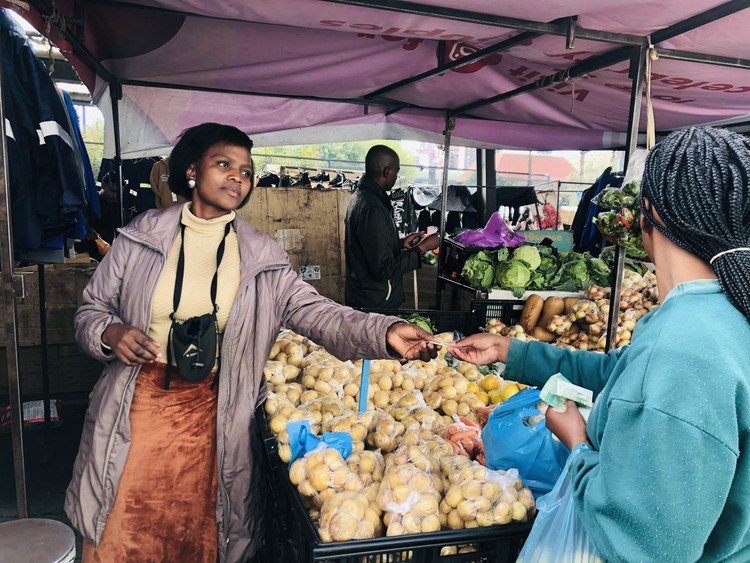
5 May 2025
Xolelwa Ndobe, a vegetable vendor since 2003, was recently told to close shop despite having a trading permit. Photos: Kimberly Mutandiro
Since the middle of February, the City of Johannesburg has run a campaign to enforce trading bylaws, verifying whether traders are properly registered and trading in designated areas.
But some traders say they were punished even though they had permits and were trading in the same places they had been for years. They were told to shut down and some had their stock confiscated.
Dimakatso Kgaphola, who sells pap, had her stall closed down at the end of February, even though she had a permit and was paying the City R120 every year. She was told the area was not designated for trading, even though she had been there for years.
After the Socio Economic Rights Institute (SERI) sent the City a letter of demand on 24 February, Kgaphola and others were able to return. But in some areas, the “harassment” continues.
“I paid for my children’s university fees through selling pap. Now that we have managed to create our own jobs, the City chases us away. What does it want us to do?” Kgaphola said.
She is one of more than 3,000 registered traders on the streets of Johannesburg.
Xolelwa Ndobe, who has been selling vegetables on the street since 2006, went through the same ordeal. Some of her neighbours had their stock confiscated without receiving impoundment receipts, she said.
In 2013, Ndobe was among dozens of lawful traders forced by the City of Johannesburg to close their stalls for several months.
The Constitutional Court ruled in December 2013 that the traders should be allowed to continue their business, ordering the City to allow them to return.
“They just come and remove us like children and never tell us in advance. The City should tell us what the problem is because some of us have already passed the employment age.” She said being removed from the streets would greatly affect her because her business helps to support her family.
Traders said that trading rules seem to change every time the City’s leadership changes.
Godswill Nwankwo, who is originally from Nigeria and married to a South African woman, says he has been a trader since 2004. He said the City officials came in February, forced him and others to close, and confiscated their goods.
This was despite him being a registered trader and paying the City every year.
“I was harassed and asked how I qualified to be registered because I’m a foreigner. We agree that we are migrants but we are not demanding City money and we sponsor our businesses by ourselves. All we want is to be allowed to run our businesses peacefully,” he said. Under the law, immigrants are allowed to trade.
Ayanda Kela, a registered trader who has sold second-hand clothes along De Villiers Street since 2001, says the City accused the traders on the street of being disorganised.
“This is our only source of employment and we are here addressing poverty and unemployment. If they chase us away from the streets, what plans do they have for us? Trading on the streets is the only choice we have.”
“The City needs to treat street traders like human beings, because they have been treating us like animals,” he added.
Ayanda Kela has been selling clothes along De Villiers Street since 2001.
On 24 February, the Socio Economic Rights Institute (SERI) sent a letter of demand to Joburg mayor Dada Morero, highlighting the 2013 Constitutional Court judgment and arguing that the City’s actions are unlawful. SERI demanded that the traders be allowed to resume trading, failing which SERi would go to court.
After the letter, it appears most traders have been allowed to return.
In response to GroundUp, City of Johannesburg spokesperson Patson Khosa said that the City “is adhering to the [2013] court order” but that “the ruling does not prevent the City from enforcing the by-laws, conduct verification of traders, and other related operations”.
“Traders are supposed to be operating/trading in the demarcated trading areas/spaces and not in violation of the by-laws by trading where they wish.”
Khosa said the operation in February was part of the City’s Accelerated Service Delivery programme. “The City was not attempting to remove legal traders from streets and confiscate goods. However, it is conducting verification of traders, which is still ongoing,” he said.
SERI also intervened in 2022 when a raid conducted by the City, together with members of the anti-immigrant group Operation Dudula, saw dozens of traders removed from the city centre. After legal action brought by SERI, the Gauteng High Court ordered that the traders be allowed to return.
Member of ActionSA and then MMC for Economic Development Nkululeko Mbundu was present at the raid and claimed on Twitter that the traders were immigrants, that SERI was using them as a “front”, and that the precinct would now be “invaded”.
At the time, SERI said Mbundu’s comments prompted threats to burn down the institute’s offices, kill their lawyers, and harm their staff. Staff had also received threatening phone calls. SERI had to temporarily close its offices. The City of Johannesburg condemned Mbundu’s comments. Mbundu denied his comments were inflammatory. He resigned from office in 2023.